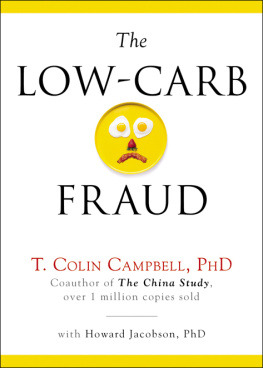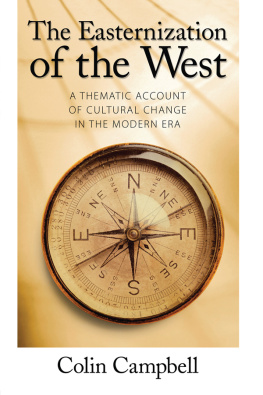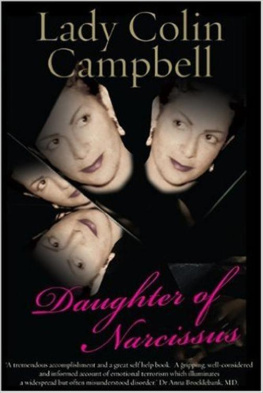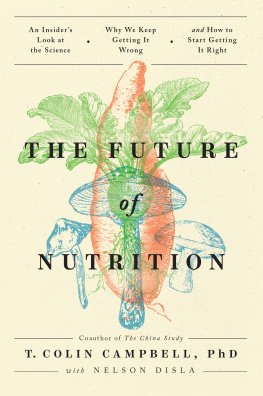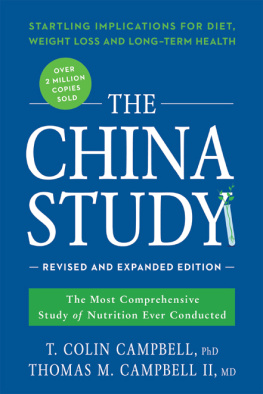Colin Campbell - The Low-Carb Fraud
Here you can read online Colin Campbell - The Low-Carb Fraud full text of the book (entire story) in english for free. Download pdf and epub, get meaning, cover and reviews about this ebook. City: Dallas, TX, year: 2014, publisher: BenBella Books, genre: Science. Description of the work, (preface) as well as reviews are available. Best literature library LitArk.com created for fans of good reading and offers a wide selection of genres:
Romance novel
Science fiction
Adventure
Detective
Science
History
Home and family
Prose
Art
Politics
Computer
Non-fiction
Religion
Business
Children
Humor
Choose a favorite category and find really read worthwhile books. Enjoy immersion in the world of imagination, feel the emotions of the characters or learn something new for yourself, make an fascinating discovery.
- Book:The Low-Carb Fraud
- Author:
- Publisher:BenBella Books
- Genre:
- Year:2014
- City:Dallas, TX
- Rating:5 / 5
- Favourites:Add to favourites
- Your mark:
- 100
- 1
- 2
- 3
- 4
- 5
The Low-Carb Fraud: summary, description and annotation
We offer to read an annotation, description, summary or preface (depends on what the author of the book "The Low-Carb Fraud" wrote himself). If you haven't found the necessary information about the book — write in the comments, we will try to find it.
The Low-Carb Fraud — read online for free the complete book (whole text) full work
Below is the text of the book, divided by pages. System saving the place of the last page read, allows you to conveniently read the book "The Low-Carb Fraud" online for free, without having to search again every time where you left off. Put a bookmark, and you can go to the page where you finished reading at any time.
Font size:
Interval:
Bookmark:
Copyright 2014 by T. Colin Campbell
All rights reserved. No part of this book may be used or reproduced in any manner whatsoever without written permission except in the case of brief quotations embodied in critical articles or reviews.

BenBella Books, Inc.
10300 N. Central Expressway
Suite #530
Dallas, TX 75231
www.benbellabooks.com
Send feedback to
First e-book edition: February 2014
Library of Congress Cataloging-in-Publication Data
Campbell, T. Colin, 1934
The low-carb fraud / T. Colin Campbell, PhD, with Howard Jacobson, PhD.
pages cm
Includes index.
ISBN 978-1-940363-09-7 (trade cloth) ISBN 978-1-940363-03-5 (electronic)
1. Low-carbohydrate diet. 2. Nutrition. 3. Prehistoric peoplesFood. I. Jacobson, Howard, 1930 II. Title.
RM237.73.C36 2014
613.2833dc23
2013037793
Copyediting by Oriana Leckert
Proofreading by Chris Gage and Amy Zarkos
Indexing by Clive Pyne Book Indexing Services, Inc.
Cover image by Getty Images
Cover design by Bradford Foltz
Jacket design by Sarah Dombrowsky
Text design and composition by Publishers Design and Production Services, Inc.
Printed by Bang Printing
Distributed by Perseus Distribution
perseusdistribution.com
To place orders through Perseus Distribution:
Tel: 800-343-4499
Fax: 800-351-5073
E-mail:
Significant discounts for bulk sales are available. Please contact Glenn Yeffeth at or 214-750-3628.
To the promoters of the low-carb diet who
prompted me to write this book
CONTENTS
I ts no secret that Americans struggle with weight loss. Since 1980, when the rise in obesity first caught the attention of the media, the national rate of obesity has doubled.
This book is primarily about low-carb dietsone of the more financially successful, and one of the most health-threatening, solutions proposed to meet our desire to shed pounds and become healthier. Well discuss why the low-carb diet is so appealing, how weve been tricked in thinking its healthy, and the truth about its health impacts. But this book is also concerned with the beliefs about nutrition that underlie those things: where the belief that carbs are bad came from, and why it has persisted despite so much evidence to the contrary.
There have almost always been fad diets with varying degrees of scientific merit, some more effective than others. Several decades ago, and still to a certain extent today, the most trusted advice was, essentially: eat less and exercise more. Weight loss was a matter of arithmeticcalories in vs. calories out. But we were also told that dietary fat is the problem. Fat is what makes us, well, fat. So if we want to lose weight, all we have to do is consume less of it.
But as the national obesity rate rose, it was clear that this advice on fat just wasnt cutting it. The Standard American Diet (SAD) also wasnt cutting it. We needed to rethink the way we looked at proper nutrition. It was during the 1980s, in the wake of these rising concerns, that the low-carb movement began to take hold. It hit its stride in 1988, with the publication of Dr. Robert Atkins New Diet Revolution, which was new only in that it followed Atkins 1972 book, Dr. Atkins Diet Revolution, which had not been especially successful in the marketplace. And this new books contents represented an appealing alternate belief system about weight, nutrition, and health.
In a nutshell, the low-carb movement told adherents to severely limit their intake of carbohydrates and instead to get the lions share of their calories from protein and fat. The problem with the SAD isnt fat, the book claims, but carbsthose found in bread, rice, and pasta, in fruit and starchy vegetables. The best way to lose weight, Atkins proclaims, is to cut back on carbs.
And it worked! By feasting on bacon and steak and butter, low-carb dieters actually did drop pounds. Which would be great, except for one important thing: the low-carb diet is not good for human health. Report after report has shown the ill effects of a high-protein, high-fat diet. Its just as bad, if not worse, than the SAD it seeks to replace.
In this book, I will explore a couple of important questions: Why do people think low-carb diets are a good idea? Whats the truth behind the low-carb hype? Whats the truly optimal diet for achieving an ideal weight while also obtaining health and longevity?
If theres one thing I hope youll take away from this book, its this: the low-carb diets ability to bring about quick weight loss is far outweighed by the serious health problems that accompany such an animal foodsheavy diet.
THE LOW-CARB APPEAL
Ive spent more than forty years in experimental nutritional research, first at Virginia Tech and then at Cornell, keeping up with the latest discoveries and doing my own work, both in the lab and in the field. And as a nutritional researcher, I was surprised at first by the popularity and commercial success of the low-carb diet, especially given its serious flaws. The research on high-protein, high-fat diets has consistently demonstrated that they have disastrous health effects and fail to secure compliance and long-term weight loss. So I think its useful to point out some factors that have contributed to these diets appeal.
Its easy to imagine why dieters might be swayedboth then and nowby the idea of trying something radically different. Millions of Americans are on diets. Food manufacturers and marketers flood the marketplace with foods designed to help us lose weight and keep it off. Television features a steady stream of infomercials touting new gadgets, exercise routines, pills, and powders that can help us shed those unsightly pounds. And, apparently, none of it is working.
For a shocking visual, compare these two slides, taken from a CDC presentation. The first slide shows data from 1990 and is far from ideal:

Forty-six of the fifty-two states and other U.S. jurisdictions report adult obesity rates between 10 and 20 percent, with obesity defined as a Body Mass Index (BMI) greater than 30. No state has an obesity rate above 20 percent.
Now look at the data from 2010:

Just twenty years later, the thinnest stateswith obesity rates under 25 percentare all heavier than the heaviest states in 1990. And twelve states have cracked the 30-percent-plus mark.
The 2011 data, which havent made it into the slideshow yet, include a new category: 35 percent or greater adult obesity rate. While it wasnt strictly necessary to add that category (Alabama came closest, with a 34.9 percent rate), the CDC were obviously planning ahead.
Given the huge diet industry and its stunning lack of effectiveness, its only natural that alternative approaches would gain popularity. Low-carb was the alternative that gained the largest amount of public acceptance and hence the greatest market share. But why did low-carb beat out the other nontraditional approaches?
One of the main answers is marketing rhetoric. On this point, I have to take my hat off to Robert Atkins. One of the major themes of my new book on nutritional science, Whole: Rethinking the Science of Nutrition (2013), is that paradigms, or entrenched ways of seeing the world, are devilishly hard to change. But Atkins and his supporters turned a century of nutritional wisdom on its head, framing dietary fat and cholesterol as nutritional heroes and attacking anyone who pointed to research showing otherwise. They gave Americans permission to eat huge amounts of some of the unhealthiest foods on the planet, and to do so not only without guilt, but with feelings of pride and superiority. The most impressive legacy of the Atkins craze is a linguistic achievement: coining the phrase low-carb and thereby turning most plant foodswhich were previously considered the healthiest dietary choicesinto dangerous and fattening no-nos.
Next pageFont size:
Interval:
Bookmark:
Similar books «The Low-Carb Fraud»
Look at similar books to The Low-Carb Fraud. We have selected literature similar in name and meaning in the hope of providing readers with more options to find new, interesting, not yet read works.
Discussion, reviews of the book The Low-Carb Fraud and just readers' own opinions. Leave your comments, write what you think about the work, its meaning or the main characters. Specify what exactly you liked and what you didn't like, and why you think so.

